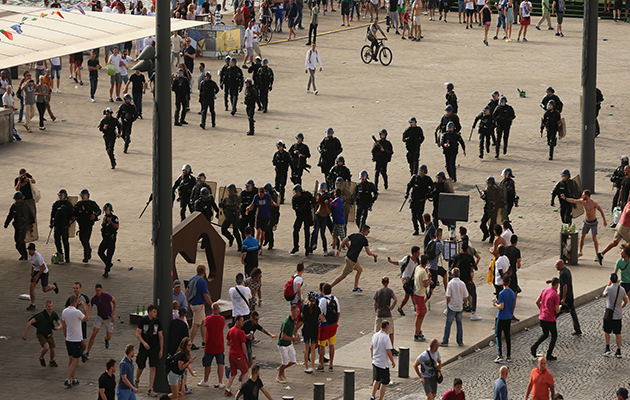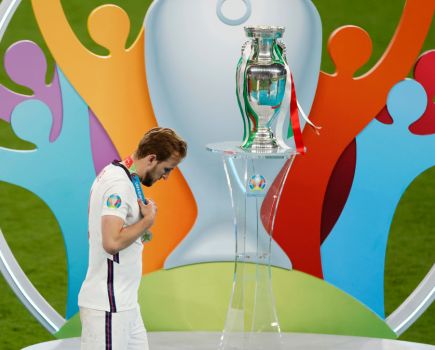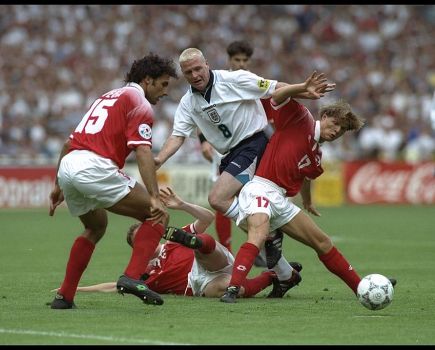For those of us who watched England’s late draw with Russia, not at the Velodrome in Marseilles, but rather among the “popolo” in Place Jean Jaures in Montpellier, there was a revealing little moment of enlightenment. That came when Vasili Berezutski scored his cruelly late equaliser for the final 1-1 result.
The big Russian defender’s goal prompted the biggest cheer of the night with southern French fans making no bones about where their sporting loyalties lay. The enthusiasm for a result which, in the circumstances, managed to make an England draw feel like a defeat may have a complex genesis. Was the anti-England feeling based on a traditional, centuries old English-French rivalry or, to some extent at least, was it a misplaced reaction to the riots in Marseilles?
The ironic aspect of much immediate reaction to the Marseilles riots was that England’s “hooligan” track record goes before them. In a situation where there is good reason to believe that the Russian fans were more prepared and more intent on serious violence than their English counterparts, many instinctively still point the guilty finger at the English fans.
That may have something to do with the last time England played a major finals game in Marseilles. That, of course, was England’s first-round game against Tunisia at the 1998 World Cup finals, when we witnessed similar scenes to those of Saturday. Over two days English and Tunisian fans alternatively “mixed it” with one another and also with the French riot police (CRS) who, then as now, resorted to tear gas to try and get the situation under control. Then as now, pundits were writing that hooliganism had “spoiled the party”
It was only normal, then, that the French man in the street will look at Saturday’s sorry scenes and conclude that, “there they go again those English fans, getting drunk and causing problems”. That much is true. The English fans did and do drink too much but, this time, there were other so-called “fans” ready for “a bit of bovver”.
Those who know Russian football argue that those involved in Saturday’s violence, be they Lokomitiv Moscow, Spartak Moscow or Torpedo Moscow fans, came to Euro 2016 looking for a chance to cause a riot in the very centre of a big French city. University researcher, Ronan Evain, who has specialised in the ways of Russian hooliganism, told sports daily “L’Equipe” that, back home, these guys are relegated to the suburbs, even sometimes to the woods if and when they want to fight.
It may emerge that there was an element of the perfect storm about these riots. Too many drunken English and a number of ill-intentioned Russian fans “bumping” into one another was bad enough. Worse again was the addition of scuffles between Olympique Marseilles and Paris Saint-Germain “ultra” fans. On top of that you have questionable crowd control and fan separation policies which end up having to rely on the CRS cops to control the day.
And, as we all know, the CRS have never been known for handling issues like this with kid gloves. Nina, a young lady who works in a Marseilles “boulangerie” close to the central Place General De Gaulle, summed up the perfect storm succintly for reporters on Saturday, saying: “Right beside my shop, there is a junction where four roads meet. On one road, there were the English, on another the Russians, on a third the local tough guys and finally on the fourth, the CRS. They were all kicking the hell out of each other.
“An English fan fell right on our doorstep. The guy was bleeding but the Russians were jumping on him with both feet. It was awful and then the local heavies got stuck in.”
UEFA is totally correct to express “its utter disgust for the violent clashes that occurred in the city centre of Marseille, and its serious concern for the incidents at the end of the match inside Stade Velodrome.” Significantly, UEFA have opened “disciplinary proceedings” against the Russian Football Union (RFU) but not against the English FA. Equally signficantly, UEFA adds: “UEFA acknowledges that there were segregation issues at Stade Velodrome and will implement corrective measures to strengthen the deployment of security personnel at stadiums, in close collaboration with local authorities.”
In the meantime, we are left with the depressing sensation that, despite all the best efforts, European football is still a long way from resolving the problems of latent, sometimes far right, sometimes racist fan behaviour always ready to raise its ugly and violent head, anywhere from Istanbul to Belgrade, sometimes passing via the Olympic Stadium in Rome.
As of now, UEFA and French police are scratching their heads. Before the tournament it was suggested (by media commentators) that because of terrorism threats, some games might be played behind closed doors. That seemed ridiculous but, given Saturday’s riots, the idea that fans might be “banned” from attending “high risk” games no longer seems far-fetched.
A ban on the sale of alcohol on match days, too, may again be considered. In an interview with “L’Equipe”, Antoine Boutonnet, head of the French National Anti-Hooliganism Organisation (DNHL) today made the following observation: “A serious question has to be asked about the intoxicated nature of these individuals [fans]. This is very worrying. Because alcohol often serves as a catalyst for violence among the fans and also violence towards the security forces…”
Tell us something we do not know, M. Boutonnet.







